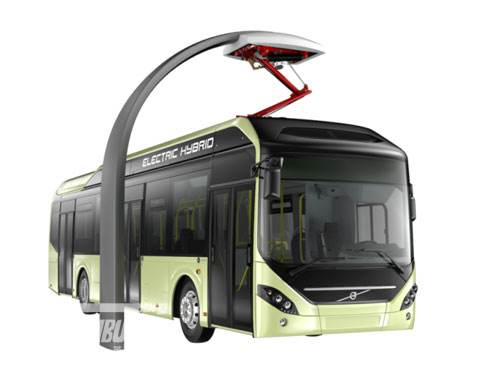The plug-in hybrid drive reduces diesel fuel consumption and carbon dioxide emissions by up to 75%, compared to a conventional diesel bus. Total energy consumption is reduced by 60%. The Volvo Electric Hybrid Driveline is an extension of the well-proven driveline used in the Volvo 7900 Hybrid. The difference lies in a more powerful electric motor, increased energy storage and equipment for overhead conductive opportunity charging. The bus is equipped with a 150 kW electric motor that delivers maximum torque of 1200 N•m (85 lb-ft) and is powered by a 19 kWh Li-ion battery pack as well as a 240 hp/918 N•m Volvo D5K 240, 4-cylinder, in-line Euro 6 diesel engine with common rail injection.

The battery pack uses a heater/cooler system which operates both at the ramp and when driving. The bus is rapid-charged at select bus stops via a pantograph. Recharging takes approximately 6 minutes at end stations. The bus, which can operate about 70% of the time on electricity, has an electric range of about 7 kilometers (4.3 miles).
The bus runs primarily in electric mode. To enable full electric drive, the bus is equipped with electric power steering; an electrical air compressor ; and a DC/DC unit that converts 600 V power to 24 V power. The DC/DC unit replaces the conventional alternator. The vehicle switches between hybrid drive and full electric drive depending on the current conditions.
When additional power is required or when battery capacity reaches a pre-determined level, the bus goes into hybrid drive. The diesel engine and electric motor then propel the vehicle together. Torque is distributed between the two units depending on the ESS charge status, speed and other conditions.
During braking or retardation, kinetic energy is generated and used to charge the ESS. This regenerated energy is later used for propulsion or for auxiliary consumers such as the air compressor, DC/DC unit or air conditioning system.
Volvo has already signed contracts with several European cities for the first deliveries. Hamburg, Luxembourg and Stockholm will implement the new bus system in 2014 and 2015. Series production is scheduled to start in early 2016.
Noise is a growing problem in many cities. The noise level beside an Electric Hybrid is 65 decibels, that is to say normal conversation level. The Volvo 7900 Electric Hybrid runs in electric mode on average 70% of the route, silent and emission-free.
Three Volvo Electric Hybrids have run in a field test in Gothenburg over the past year, a test that has verified the reduction in energy consumption and emissions. As of this autumn and for two years ahead, eight Volvo Electric Hybrids will be put into regular operation in central Stockholm. This is part of ZeEUS, an EU project being conducted in six European countries.